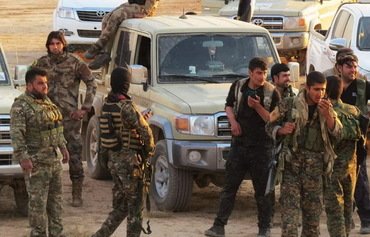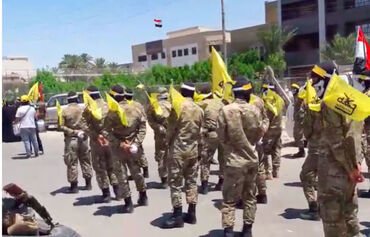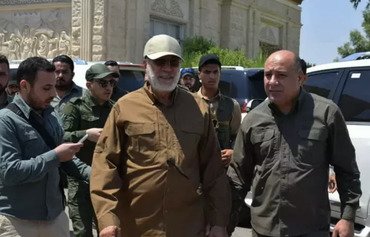Iran-backed Iraqi militias have responded to recent Iraqi government decisions with hostility and disregard, drawing the ire of Iraqi officials and sparking public criticism of their actions, experts and officials told Diyaruna.
Since July, when Iraqi Prime Minister Adel Abdul Mahdi announced he was planning to restructure the Popular Mobilisation Forces (PMF), threats and incitement from militia leaders against the government have been on the rise.
The July 1st decree ordered the integration of all armed groups into the Iraqi army, with PMF elements required to sever all ties to their former militias, and checkpoints and affiliated offices belonging to the militias also to be shut down.
The decree followed a series of attacks against diplomatic missions and international interests in Iraq that were blamed on armed groups linked to Iran.

Deputy head of the Popular Mobilisation Forces Abu Mahdi al-Muhandis (centre) is seen here with 30th Brigade head Waad Qado (right) in a photo posted on the 30th Brigade's website on August 9th.
In an initial response to the decree, Iran-aligned Kataib Hizbullah said it viewed the decision as an attempt to "criminalise" and "offend" its members.
In a July 22nd announcement that also angered some Iran-backed militias, Abdul Mahdi said he was exonerating former Anbar Operations Commander Maj. Gen. Mahmoud al-Falahi.
Al-Falahi had been the victim of a smear campaign, in which pro-Iran media outlets accused him of treason.
In a statement, Kataib Hizbullah threatened it would "not let things pass this simply", and similar stands were taken by Iraqi political leaders close to Iran.
Adversarial relationship
The adversarial relationship between the government and Iran-backed armed militias is not new, political scientist Issam al-Fayli told Diyaruna.
It has its roots in the militias' adoption of the Wilayat al-Faqih (Guardianship of the Jurist) doctrine, which calls for allegiance to Iran's supreme leader Ali Khamenei, he said.
This puts these militias in direct ideological conflict with the Iraqi government, he explained, as adherence to this doctrine does not permit them to place Iraq's national interest first.
Meanwhile, the Iraqi government is trying to distance itself from regional conflicts and tensions, he added, noting that Iraq does not want to be dragged into conflicts that threaten its security and stability.
This is especially important as Iraq has only recently come out of a debilitating war with the "Islamic State of Iraq and Syria" (ISIS), and is still fighting the group's remnants, he said.
The PMF's 30th Brigade, led by Waad Qado, recently defied government orders to vacate its headquarters and withdraw from Ninawa Plains.
On August 5th, Iranian media reported that Harakat al-Nujaba spokesman Nasr al-Shimmari had said his militia was capable of "overthrowing any Iraqi government within a matter of weeks in the event it takes sides against Iran".
The following week, Harakat al-Nujaba scholars' Shura council head Youssef al-Nasseri called for disbanding the army and described its members as mercenaries.
In response to widespread public anger against his statement, however, the PMF publicly disassociated itself from al-Nasseri, saying his remarks "represent his personal viewpoint".
Conflicting loyalties
"There are around 34 Iraqi militias linked with Iran's Islamic Revolutionary Guard Corps (IRGC) which receive support, weapons and orders from the IRGC's Quds Force," political analyst Ghazi Faisal Hussein told Diyaruna.
These militias "are loyal to the Iranian supreme leader, Ali Khamenei, and follow the Wilayat al-Faqih doctrine", said Hussein, who serves as an advisor at the Iraqi Centre for Strategic Studies.
"This fatalistic and ideological connection is what prompts these groups to fight to the death on behalf of Tehran," he said.
It also explains why these factions "clash with the [Iraqi] government and damage its official institutions when any government decision adversely affects the Iranian will and aspirations", he added.
"The transgressions of these militias and their constant defiance of the [Iraqi] regime and law is dangerous," Hussein said, stressing that they "do not care about the fate or future" of Iraq.
In response, the Iraqi government is trying to adopt balanced foreign policies and stand firm against any illegal acts or violations of the constitution, he said.








